Check out some books by your tutor Fiona Veitch Smith … (click on the book covers to find out more)
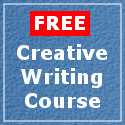 Hello everyone, welcome to the first session of our free online creative writing course. Over the next eight sessions we will be looking at different aspects of creative writing and trying our hand at various forms. I’d strongly encourage you to have a go at the exercises along the way, and please feel free to leave comments or ask questions at the end. If you have arrived on this page without first reading the home page and frequently asked questions page (on tab above) please go back and do so now. If you have read them, enjoy the course!
Hello everyone, welcome to the first session of our free online creative writing course. Over the next eight sessions we will be looking at different aspects of creative writing and trying our hand at various forms. I’d strongly encourage you to have a go at the exercises along the way, and please feel free to leave comments or ask questions at the end. If you have arrived on this page without first reading the home page and frequently asked questions page (on tab above) please go back and do so now. If you have read them, enjoy the course!
Creativity and Art
What is creativity? The Collins dictionary defines it as ‘the ability to cause something to exist’. Without getting into too much of an existential discussion, I would say that with every thought that is expressed, something has been created. It was Descartes who said: ‘I think, therefore I am’; well I would add, ‘I think, therefore I create’ (do you feel a God complex coming on?). But how do we express our thoughts? Sometimes we do it verbally, other times by body language and still again through what is loosely termed ‘art’.
Art takes place when a thought is expressed and fixed in a way that other people may experience it on an aesthetic level – through music, writing, painting, sculpture, choreography and so on. Many artists say that their best work takes place when they ‘by-pass’ the thought and simply express the feeling. This may be true, but for writers, who use a verbal medium, a feeling must first be converted into a thought before it can be put into words. Don’t over analyse the thought before you express it, as this way you can ‘channel’ the purest interpretation of the feeling, but some cognitive process needs to take place. Some writers prefer to mull over a thought and give it form before they put pen to paper – I’m one of them – but it’s good practice to try and switch off the ‘editor’ at least for the first draft. First response trigger exercises are useful in this regard and can release some unexpected words and images.
Exercise 1:
Write down your first response to these words or phrases:
- Blue ball
- And that’s when the sadness came
- Coffee
The first task of a good writer is to convert feelings into thoughts and then into words. This is the raw material that can then be converted into something more permanent. Some writers refuse to toy with their first drafts, believing their creativity will be diluted; I disagree. Allowing your critical mind to improve a piece of writing is where the craftsman meets the artist. Something produced only by the former will lack soul and something by the latter will lack form. Good writing is a combination of art and craft.
For public consumption
Art, of course, is highly subjective and one woman’s masterpiece is another woman’s unmade bed. We all have the ability to create, but whether or not our creation is ‘art’ must be left to the eye or ear of the beholder.
In this session we will look at how you can craft those creative thoughts into creative writing to share with other people. And that’s what sets ‘public’ writing apart from ‘private’ scribblings – there’s a perceived readership in mind. When I ramble on in my journal, I am the only one who will read it (hopefully!) so my only concern is getting my thoughts down on paper. The moment I want someone else to read it I begin to consider ways to improve the presentation and craft it into something more aesthetically pleasing. I consider which words may sound more colourful, whether or not my sentence structure is grammatically correct, whether I’m using evocative imagery, and so on.
Story, feeling or image?
What is it about those creative thoughts that you think might be of interest to other people? Do they speak of an eternal truth or a common experience? Do they make you laugh or cry? Do they suggest a story that will entertain or a poem that captures a moment that must be shared?
Exercise 2: In 50 words or less write down why you want to write then list three creative thoughts that you’ve had lately (each 10 words or less). These may be an image, a musing, a ‘truth’, a story, or so on. If you haven’t had any, take yourself for a walk and look around; what grabs your imagination? Browse through a newspaper or a magazine; do any stories or pictures catch your attention? Think back over your day; did anything funny, charming, shocking or unusual happen to you or someone you know?
Poetry or prose?
Some people are more suited to writing poetry than prose and some people do well at both. Although we won’t be discussing it in this course, other people are more suited to script. I’m one of them. I’ve had relative success as a prose writer and in fact have managed to earn a living from it, but it’s taken years of hard work to get to this point. I recently branched out into scriptwriting and found that I had much more of a natural ability. (If you’re interested in finding out more about scriptwriting, check out getting started in playwrighting). You may find that you’ve been trying to make it as a poet when actually you’re more suited to prose. Now I don’t want to pigeonhole anyone, but ask yourself the following questions:
- Are you more attracted to films than stills?
- Do you enjoy telling people ‘stories’ from your life?
- Do you prefer to read stories or poems?
If yes, to these, then you may be more suited to prose than poetry. If no, then the opposite may be true. If it’s ‘sometimes yes, sometimes no’ then perhaps you are suited to both. We shall be looking at how to write poems in more detail in session 7, but suffice to say, a poem is like a snapshot of a moment. If you can’t rest until you know what happened before and after, then prose may be your genre.
Exercise 3: Take one of the three creative thoughts you wrote down in Exercise 2, then list 20 separate words that communicate or describe that thought. Do not, at this stage, link the words into sentences. Once you have your 20 words use them in a poem of 16 lines or less. Then, take the same 20 words and work them into a short story of under 300 words. Which exercise came more easily? Which form has best communicated your creative thought?
Further Resources:
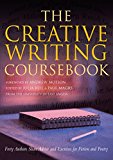
There are some excellent resources out there for creative writers. To get quick ‘starter’ images when your own well is dry I recommend The Writer’s Block by Jason Rekulak. I’m currently working through The Creative Writing Coursebook by Julia Bell and Paul Magrs and finding it very useful.
The next creative writing course session is how to write a short story. But before you move on to that, please feel free to leave a comment or ask a question in the box below.
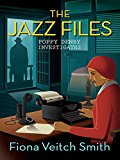
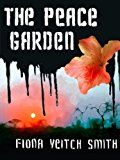
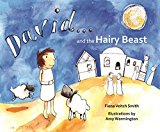
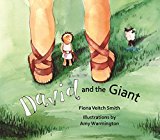
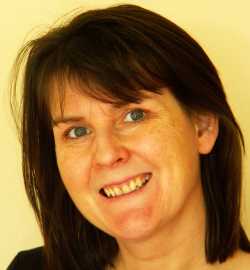 Welcome to The Crafty Writer's free online creative writing course, presented by Fiona Veitch Smith, a freelance journalist, editor, author, playwright, screenwriter and writing teacher. I hope that you'll see a dramatic improvement in the quality of your writing as you work through this course.
Welcome to The Crafty Writer's free online creative writing course, presented by Fiona Veitch Smith, a freelance journalist, editor, author, playwright, screenwriter and writing teacher. I hope that you'll see a dramatic improvement in the quality of your writing as you work through this course.
What is a line? Is a line in poetry a full sentence? Or a thought?
Hi Tracy. In poetry a line is the physical thing that appears on the page. It can be a full sentence or simply a word or two – depends on how you space it out for emphasis/
Good day
Thank you for this course, and the book recommendations. I’ve written my 1st book (started in 2014). It’s currently with my publisher. I’m in the process of writing my 2nd book. Today I learnt to use / gear my mind toward more creative ways. I’m looking forward to the remainder of this course. Regards
Fiona,
Having always been drawn to prose writing, I found the exercises here in this first creative writing course session very effective and easy in confirming writing that is most appealing to me.
What does “prose” mean? I’m new at this, or at least I’m new at doing lessons online.
Hi Rin. Prose is writing that isn’t poetry. Written in full, proper sentences. Prose can either be fiction or non-fiction. Novels are prose and so are short stories.
I can learn a lot in this class.
It is interesting
Thank you for this course. Growing up I always had either a pen in my hand or my nose in a book. I’ve always been attracted to the written word and have always wanted to write fiction. I’ve hardly written anything in the past 20 years and haven’t read much more (other than home keeping articles and blogs). I’m starting to feel the creative blood begin to boil again and was looking for a refresher. Thank you!
You’re most welcome. Enjoy!
Hi Fiona,
I am interested in Creative Writing but because of my age (76 years old)and poor health I am not able to take classes in Creative Writing attending classes. I am a frustrated writer, wish to be a journalist but my mother forced me to be a teacher. As of now,I post my articles on Facebook but am not confident on how I write so would like to know the techniques in writing and also would like to write children’s books. Please help me. Thank you!
Hello. This course will certainly help you with your technique. And the good thing about it is that you don’t have to leave home to do it – and it’s free! That was one of the main reasons I put these sessions up so people like you could have access to it. I hope you enjoy the course and as you work through the exercises your confidence will grow.
Hi Thanks for that! Well, towards the end of this first course, exercise 3 (300-word short story) I made the mistake of not saving all the work I worked on during the exercises and LOST all my work. It’s ok. I learned from it, I really do wish I would have saved it so that I can save my work and reference back to it. Do you recommend doing this course again in order for me to save my work, or would you say it is ok to move on to the next course without any saved work, considering the fact that I did complete every exercise in this course?
Thanks for that! Well, towards the end of this first course, exercise 3 (300-word short story) I made the mistake of not saving all the work I worked on during the exercises and LOST all my work. It’s ok. I learned from it, I really do wish I would have saved it so that I can save my work and reference back to it. Do you recommend doing this course again in order for me to save my work, or would you say it is ok to move on to the next course without any saved work, considering the fact that I did complete every exercise in this course?
I began this free course a couple days ago, it’s great by the way! I love how you speak my language and I can fully connect with your course
Thanks for your help.
Lost me,
AB
Oh what a pity! As it’s free why don’t you do it again. You may come up with something different this time. But it’s up to you. Or you can just dip in and out of it. It would be good to have some pieces of written work to take out of it and build on. Happy writing.
I love the starter ideas, I could not come up with a jump off point at all. It’s a great idea. I will use those throughout the story I think. My uncle writes plays and he loves it. I love to entertain and have been joining story telling groups. I haven’t actually read one yet, but I will. I’ve got a head full of stories just gotta get them in the right format. Thanks.
Sounds like you’ve got stories just waiting to be written, Joan. Enjoy.
hello Fiona, thanks you for offering people this opportunity to learn. i write articles for a (business) blog and magazine, my writing and language structures they said is not top notch. Any advise pls.
Hi Jimmy, there are lots of free online English language courses. Just google ‘free English language courses’. This course is not what you’re looking for as it is creative writing not actual language development. The British Council I know does some https://www.futurelearn.com/partners/british-council Good luck.
I enjoyed this exercise and look forward in the next. I have written and my own illustration for my books. I am hoping this course will help me to improve my writings and have them published one day. Could you please tell me what a proofreader actually does? I am always hearing about proofreading and I am one that do not like things change such as words. If they are just making sure that punctuation is correct,then there is no problem. Thank you for the this course. Gayle
Hello Gayle,
A proofreader is the last person who looks at a piece of writing before it goes to publication to make sure everything is correct – no missing words, correct spelling, no text dropping off the bottom of the page etc. They won’t ‘change’ anything, just correct it if it’s wrong. But they are only the FINAL edit. Before that at least one other editor will have looked at the writing and it is at that stage that things are changed. And yes, sometimes it’s whole words, sentences and even paragraphs. They make sure the writing is correctly structured and flows properly. A book editor will show you the changes that are suggested and you can discuss them. A magazine editor usually just goes ahead and makes the changes without consulting you. So if you are serious about being published you need to be prepared to change things that an editor thinks are not working as well as they could – and not just punctuation.
I discovered that prose comes more naturally to me, but I can still somehow make poems work. I like this class.
Hello! I have no training whatsoever but have always loved writing prose. As I’ve gotten older, I’ve had a desire to hone in on some skills and get new ideas. This is just for me but one never knows what happens in the end! Thank you for making this avaiable! Looking forward to the rest.
You’re most welcome, Rachel. Happy writing.
I am looking forward to this class. I never written anything accept school papers but i would like to become a writer. I have always had ideas for stories running around in my head all day. I would like to put these stories on paper. I think your class will help me do that.
Hello Vanessa. It should certainly help get the stories out. Happy writing.
I’m preparing to go intoa creative and preforming arts highschool for writing ,and these courses have really helped me to get in extra practice and learn new skills before the new school year.Thanks for making this avaliabe!
You’re most welcome Cierra. I do hope you enjoy your next years at high school. How exciting!
Thanks so much for this free class. I am a rabid blogger and writer who needed a dose of pepper to inspire me to move from short story to novella. In a few minutes, these exercises have added such joy, a sneeze, an opened window. A fresh breeze.
You’re welcome Mokihana.
I am so grateful for this free class to at least help me get started again in the right direction.
Question: Are we going to do anything with Ex.2, “Why Do I Want To Write?” I really hope so, because I just found out some things about myself I didn’t know before! Thanks
Hello.The exercise is simply there to help you explore your own feelings and emotions about writing. I’m glad you got something out of it. It will not be picked up on again, but hopefully you can draw on your feelings as you progress through the exercises.
I really enjoyed that exercise Fiona. It was quite a challenge to get all 20 words in but an enjoyable one nonetheless! I’ve never written poetry before but found it came surprisingly easily as did the writing. Looking forward to the next exercise and thank you for this free inspiration! ))
))
You’re welcome, Tamara. I always enjoy the 20 word poem exercise.
I can’t determine what my style of writing is… It didn’t seem to follow a set structure, with grammatically correct sentences but yet it didn’t feel like poetry. I like the way the words sound in my head when I read them, the spaces and noise between them. But it seems dirtier, grittier than I would expect poetry to be.
How do I know if what I’ve written is poetry or prose?? Or something else entirely?
Poetry isn’t always grammatically correct. The way the words sound and flow is more important.